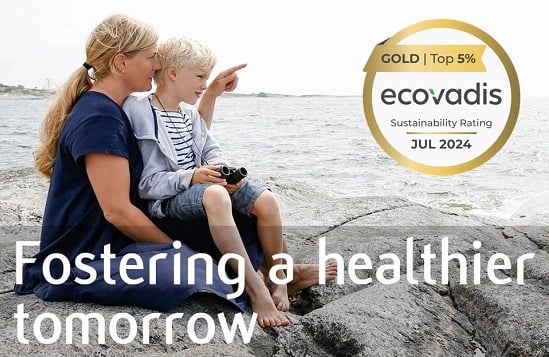For a better life
12.10.2016
In the summer, Shire, a pharmaceutical company specialising in rare diseases, and Oriola expanded their co-operation in Finland. In Sweden Shire had already picked Oriola as its partner.
Shire is one of the world’s leading biotechnology companies, and since June Oriola has handled the warehousing and distribution of the full portfolio of Shire’s products in Finland. In Sweden Oriola has been Shire’s pharmaceutical warehousing and distribution partner since last March. The head office of Shire Nordic, which is responsible for all of the Nordic and Baltic countries, is located in Sweden.
Shire was founded 30 years ago in Hampshire, England, and it concentrates on researching and developing drugs for rare diseases and diseases that require demanding, specialised hospital care.
Globally Shire has more than 22 000 employees in more than 60 countries and its products are available in over 100 countries. It has head offices in the United States, Ireland and Switzerland. The company has grown through product development, strategic acquisitions and innovative licensing agreements.
“Following our merger with Baxalta in June, we are even stronger in Finland and the other Nordic countries. At the same time we expanded our operations to the Baltic countries," says Kaisa Elomaa, Medical Lead at Shire Finland.
Last summer, the US magazine Newsweek ranked Shire as the world’s greenest company.
Mission: a better life
A disease is considered rare if no more than five out of 10 000 people have it. According to Elomaa, there are between 6 000 and 8 000 rare diseases in the world.
“It is our mission to help people with rare diseases to live a better life. We want to become the global leader in rare diseases,” Elomaa says.
Shire's principal areas of research are haematology, especially haemophilia, inherited metabolic storage disorders and HAE or hereditary angioedema, immunology (especially immunodeficiency disorders), oncology, gastroenterology and endocrinology, central nervous system disorders (including ADHD) and ophthalmology.
Strong development pipeline
During the next two to three years, Shire will launch many new drugs.
“We have a very strong development pipeline and over 50 on-going clinical development programmes at the moment. We have almost 20 on-going phase three clinical programmes on new innovative molecules and currently 10 molecules at the registration and marketing authorisation stage,” says Elomaa.
Since there are so few people with rare diseases, it is impossible to conduct broad clinical studies with hundreds or thousands of patients, according to Elomaa. This is why patient trials are based on a small number of patients, something that the authorities understand. The procedures for authorising and reimbursing drugs for the treatment of rare diseases are otherwise similar to those for other reimbursable drugs.
Difficult and disabling diseases
“Rare diseases are often difficult and disabling. It often takes years for a patient to receive the correct diagnosis. During this time the diseases often advance and cause damage to internal organs. For this reason authorisation practices should be as flexible as possible so that a drug will be available to a patient at the right time,” Elomaa says.
Drugs for rare diseases must first gain so-called orphan drug status. The drugs must meet strict criteria: there can be no more than five patients out of 10,000 and if a drug for the disease already exists, the new one must be more effective and have better tolerability.
If the drug does not have market authorisation in Finland, a procedure for special authorisation is used.
“It is theoretically possible that drugs for rare diseases are not introduced to all markets because there are so few patients. We have been lucky in Finland in this respect because while Finland is a small market, it has not occurred here,” Elomaa says.
Critical transportation
Many of Shire’s drugs are biopharmaceuticals that are manufactured using highly specialised methods. External conditions are critical and it is important that they are handled appropriately.
The permitted temperature conditions must be observed precisely. The refrigerated transport chain must not break and the biopharmaceuticals must not be allowed to freeze.
“We trust that Oriola will handle the warehousing and transport of these drugs well. Oriola is an experienced company with a wide offering of services and high standards."
Smooth co-operation in Sweden
“In Sweden, Oriola was at first a partner of Viropharma, which was then merged into Shire. Since Shire Nordic wanted to use a single distributor and distribution centre, it chose us as its warehousing and distribution partner in Sweden last spring,” says Andreas Malmberg, Key Account Manager at Oriola in Sweden.
According to Malmberg, Oriola was chosen because of its logistics operations, favourable experiences from its co-operation with Viropharma and the pricing of its services.
“Shire Nordic has been very satisfied with our quick service and precise reporting, including daily sales statistics,” says Malmberg.
In Sweden, Shire has also started using Oriola’s additional services.
“As of the end of August we have started delivering product packages intended for hospitals to all Shire sales representatives in Sweden, Denmark, Norway and Finland. In addition, we handle import permit applications for Sweden on behalf of Shire Nordic,” Malmberg says.
“In Finland, Oriola could help us with hospital offers, for instance. If needed, we can eventually use tailored additional services," says Kaisa Elomaa.
Q&A
Answers by Key Account Manager Simon Ollus from Oriola
What kind of cross-border account management can Oriola offer Shire?
We hold regular account meetings with Shire’s representatives. They include Oriola’s Key Account Managers from both countries. We discuss common indicators and inform each other of current issues.
We are currently conducting a SAP development project which will allow harmonised information systems and consistent reporting for Shire in Finland and in Sweden. Since both countries are on the same CRM platform, reporting for the entire area will be available from single source.
What could cross-border co-operation in warehousing include?
On a concrete level, co-operation could mean a central warehouse in one country and a smaller one in the other.
What kind of warehousing and distribution do Shire’s rare disease drugs require?
The rare disease drugs manufactured by Shire require special monitoring and control measures during warehousing and distribution. These expensive speciality products must often be kept separate from other products to protect them from damage. Biological pharmaceuticals are often more sensitive than other drugs and generally require a refrigerated transport chain and close monitoring of conditions.
Text: Leena Koskenlaakso
Photo: Vesa Tyni


